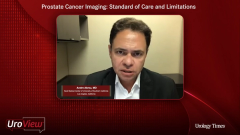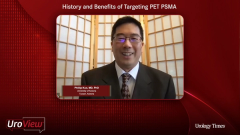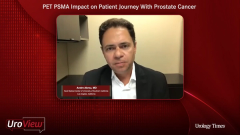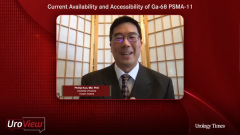
Impact of the Phase III VISION Trial
Andre Abreu, MD, and Phillip Kuo, MD, PhD, on future use of PSMA targeted therapy, including insight on the phase 3 VISION trial, which used 68Ga-PSMA-11 PET/CT to identify patients for targeted treatment with 177Lu-PSMA-617.
Episodes in this series

Phillip Kuo, MD, PhD: For our final question, we are going to delve a bit into the future. I am going to start with a discussion of the recent positive outcome reported by Novartis [Pharmaceuticals] of the VISION Study. For those of you who don’t know, VISION is a phase 3 clinical trial in which they used gallium-68 PSMA-11 to select patients who were PSMA [prostate-specific membrane antigen]-positive to then get targeted therapy with PSMA-11 bound to lutetium 177. I am sorry to throw out a lot of radioisotopes there. The gallium-68 PSMA-11 is a PET [positron emission tomography] agent that we use to image. If our patients’ tumors express PSMA, they will then take up the radiotracer and show up on our scan. We can measure the levels of intensity. If the patient met a certain criterion—and I was privileged to help in the design for selecting patients for the study—then they would go on, after you have proven that there are tumors that express this PSMA, to receive PSMA-targeted therapy with this lutetium 177, which is a beta particle emitter.
This radioactive isotope will then, instead of release photons, release these beta particles or electrons of high energy, which will then go on to destroy the tumor. This is what people may have heard of, this theranostics paradigm, where you conduct the diagnostic to prove that the target is there on the tumors, and then you treat it. Novartis very recently reported that there was a positive outcome of the study. The details are still to come, and this does not mean FDA approval, to be perfectly clear, but they are going to be revealing more details on the positive outcomes of that study, with which they will undoubtedly go to the FDA to seek approval.
Prostate cancer imaging, with this revolution that’s coming soon, it is already here in many regards with PSMA PET, can really personalize the therapy. As you have pointed out, starting with the initial staging, particularly the high-risk group, the UCLA [University of California, Los Angeles] and UCSF [University of California, San Francisco] studies showed there was clinically significant detection of nodes in the high-risk patient population. They also showed, in the biochemical recurrence, very high sensitivity and accuracy.
You can personalize your therapy, like I said, along each way. Not only were these patients upstaged by PSMA PET, which we are very used to with FDG [fluorodeoxyglucose], but some of them were even downstaged. This has produced more accurate staging, whether it is upstaging or downstaging. Then there is this final bit with the VISION study, which focuses on the end of the spectrum with aggressive prostate cancers. This was the population with metastatic castrate-resistant prostate cancer that had already had at least exposure to a taxane. These patients have aggressive prostate cancer. We will see these results. Again, thank you for pointing out, whenever you hear about positive outcomes, it is very encouraging, but we also need to hear about the [adverse] effects, of course. There is always a balance between that. In closing, I would like to thank Dr Abreu, my colleague, for participating in this discussion. I enjoyed it and learned a lot, as always. Any final thoughts?
Andre Abreu, MD: No, I just want to thank you for what I have learned from you, and sharing with you was a great experience. Thank you for all your thoughts. Thank you for this opportunity. I learned a lot from you.
Phillip Kuo, MD, PhD: I appreciate it. Thank you, the viewing audience. We hope you found this Uro View video series and discussion to be very rich and informative.
Transcript edited for clarity.
Newsletter
Stay current with the latest urology news and practice-changing insights — sign up now for the essential updates every urologist needs.









